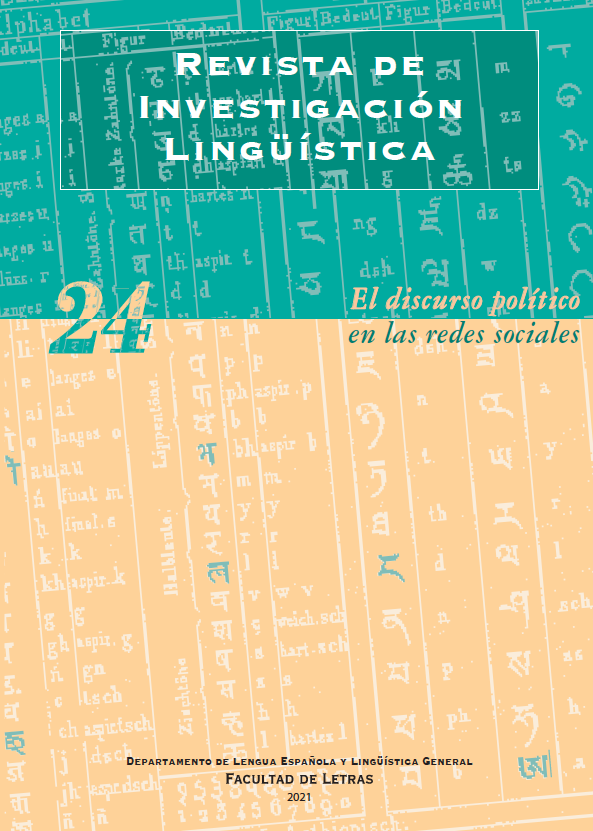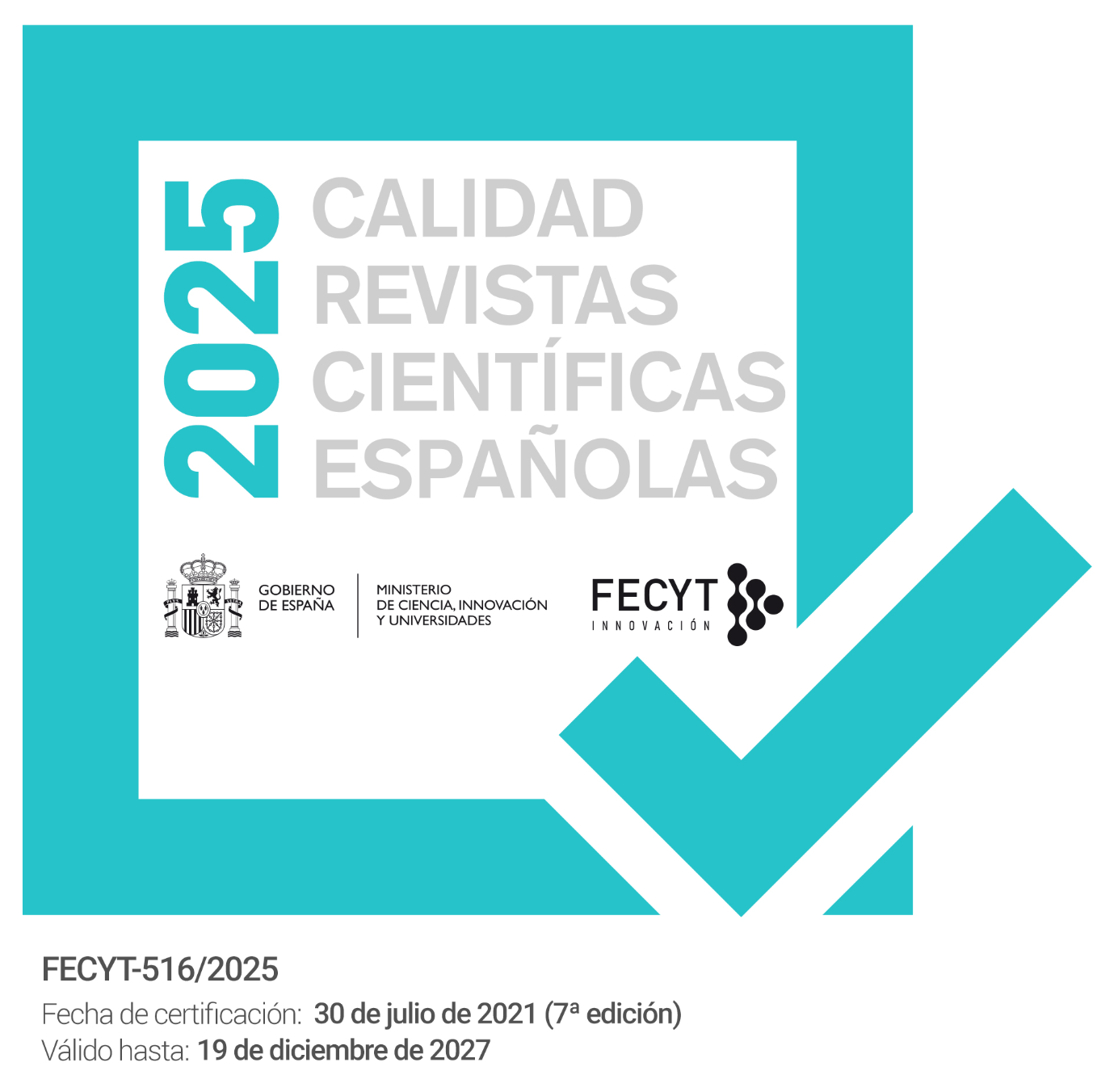Vox frente a Europa: la derecha radical en Twitter durante las elecciones europeas de 2019
Abstract
Vox, the Spanish radical right-wing party, has in the social network Twitter one of the fundamental pillars of its political communication strategy. In this paper, we review the idea of Europe projected by this political formation in its messages on the campaign for the 2019 European elections, when it obtained for the first time representation in the European Parliament. Through the critical discourse analysis applied on a sample of representative tweets, it is discovered that the subtle meanings in these messages replicate the virulence of Vox's more obvious national approaches, although under a form of greater political correctness that cannot avoid ideological perseverance.
Downloads
-
Abstract687
-
PDF (Español (España))733
References
Applebaum, Anne (2019): «Los secretos de la estrategia de Vox», El País 12/5/ 2019, En línea: <https://elpais.com/elpais/2019/05/10/ ideas/1557485729_129647.html> [15/04/2021].
Castells, Manuel (2017): Ruptura. La crisis de la democracia liberal, Madrid, Alianza Editorial.
Castells, Manuel (2018): «Introducción: ¿un sueño que se desvanece?» en Ma- nuel Castells et al. (eds.), La crisis de Europa, Madrid, Alianza Editorial. Eatwell, Roger (2007): «The concept and theory of charismatic leadership», en Antonio Costa Pinto, Roger Eatwell, Stein Ugelvik Larsen (eds.), Charisma and Fascism in Interwar Europe, London, Routledge, pp. 3-18.
Engel, Jakob y Ruth Wodak (2013): «Calculated ambivalence and Holocaust denial in Austria», en Ruth Wodak y John E. Richardson (eds.): Analyzing fascistdiscourse: European Fascism in Talk and Text, London, Routledge, pp. 73-96.
Ferreira, Carles (2019): «Vox como representante de la derecha radical en España: un estudio sobre su ideología», Revista Española de Ciencia Política 51, pp.73-98. DOI: https://doi.org/10.21308/recp.51.03.
Gallardo Paúls, Beatriz, Salvador Enguix Oliver y Joan M. Oleaque Mreno (2018): «Estilos de gestión de los perfiles políticos en Twitter». Revista de Investigación Lingüística 21, pp. 15-51. DOI: https://doi.org/10.6018/ ril.21.367371
Gallardo Paúls, Beatriz y Salvador Enguix Oliver (2021): «Ataques a la prensa y competencia informativa en el discurso de derecha radical», en Retóricas negativas: la desinformación de derecha radical y su cobertura mediática, Valencia, Tirant lo Blanch, pp. 51-83.
Gil, Andrés (2019): «Contra la migración y la integración europea: el programa de Vox para el 26M». elDiario.es 15/5/2019. En línea: <https://www.eldia- rio.es/politica/migracion-integracion-europea-programa-vox_1_1548932. html> [22/04/2021].
KhosraviNik, Majid (2017), «Right wing populism in the West: Social Media Discourseand Echo Chambers», Insight Turkey, 19(3), pp. 53-68.
Lakoff, George (2007), No pienses en un elefante, Madrid, Editorial Complutense. Magallón, Eduardo (2019), «La Reconquista que no existió», La Vanguardia, 8/12/2019.
Oleaque Moreno, Joan M. (2020), «El discurso en positivo de Vox: los medios difundido en Twitter por la extrema derecha». Cuadernos AISPI,16/2, pp. 45-62. DOI: https://doi.org/10.14672/2.2020.1697
Oliván Navarro, Fidel (Coordinador) (2021): El toro por los cuernos. Vox, la extrema derecha europea y el voto obrero, Madrid, Tecnos.
Peinado, Fernando y Daniel Muela (2018): «El negocio de la manipulación digital en España», El País 23/05/2018. https://elpais.com/olítica/2018/05/17/ actualidad/1526571491_535772.html
Reisigl, Martin y Ruth Wodak (2015). «The discourse historical approach (DHA)», en Ruth Wodak y Michael Meyer (eds), Methods of Critical Dis- course Studies. Third Edition, London, Sage.
Rey Vázquez, Enrique (2019): «ForoVox». CTXT, Contexto y Acción, 16/1/2019. En línea: <https://ctxt.es/es/20190116/Politica/23908/Enrique-Rey-Vaz- quez-Vox-Forocoches-ultraderecha-jovenes.htm> [05/05/2021].
Rubio-Pueyo, Vicente (2019): «Vox: ¿Una nueva extrema derecha en España?», Rosa Luxemburg Stiftung. New York: Andreas Günther editor. En línea: <http://www.rosalux-nyc.org/wp-content/files_mf/rubiovox_esp_final_ web.pdf > [09/05/2021].
Simón, Pablo (2021): «Prólogo» a El toro por los cuernos. Vox, la extrema derecha europea y el voto obrero, Madrid, Tecnos.
Suau-Gomila, Guillem, Salvador J. Percastre-Mendizábal, Gemma Palà-Navarro y Carles Pont-Sorribes, Carles (2017): «Análisis de la co- municación de emergencias en Twitter. El caso del Ébola en España», en Uso y aplicación de las redes sociales en el mundo audiovisual y publicitario, Javier Sierra y Sheila Liberal Ormaechea (eds.), Madrid, McGrawHill Education, pp.119-130.
Villar, Paz (2021): «Retóricas populistas y derecha radical: las retóricas negativas», en Retóricas negativas: la desinformación de derecha radical y su cobertura mediática, Valencia, Tirant lo Blanch, pp.11-20.
Wieviorka, Michel (2018): «El ascenso de la derecha radical», en Las crisis de Europa, Manuel Castells et al. (eds.), Madrid, Alianza Editorial, pp- 468-481.
Wodak, Ruth (2015): The politics of fear, London, Sage.
Wodak, Ruth (2019): «The boundaries of what can be said have shifted: An expert interview with Ruth Wodak (questions posed by Andreas Schulz)», Discourse & Society, 31(2), pp. 235-244. DOI: https://doi. org/10.1177/0957926519889109
Copyright (c) 2022 Journal of Linguistic Research

This work is licensed under a Creative Commons Attribution-NonCommercial-NoDerivatives 4.0 International License.
The works published in this magazine are subject to the following terms:
1. The Publications Service of the University of Murcia (the publisher) preserves the economic rights (copyright) of the published works, and favors and allows the reuse of same under the license of use indicated in point 2.
2. The papers are published in the electronic edition of the magazine under a Creative Commons Attribution-NonCommercial-NoDerivative 3.0 Spain license (legal text). Papers may be copied, used, disseminated, transmitted and publicly exhibited if the following requirements are met: i) The authorship and the original source of its publication (magazine, editorial and URL of the work) must be cited; ii) The works cannot be used for commercial purposes; iii) The existence and specifications of this user license must be explicitly mentioned.
3. Self-archiving conditions. Authors can electronically disseminate pre-print versions (version before being evaluated) and / or post-print versions (version evaluated and accepted for publication). This makes possible its circulation and diffusion earlier and with it a possible increase in its citation and reach among the academic community. RoMEO color: green.










